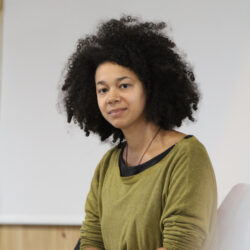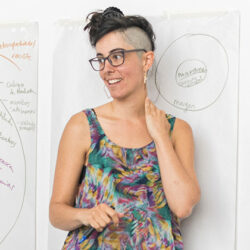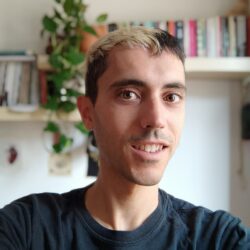exploring the deeper dynamics of collaboration, for transformation.
This training builds upon the methodology and practices of our signature Transformative Collaboration course and takes them deeper. It is designed for people with significant experience of working in groups, who want to go below the surface of group dynamics, explore unconscious patterns, and work alongside peers to draw on collective insight into the common challenges groups are facing in our current movements.
We hold transformation as a central principle of collaboration: in order that we see transformation in the world, our groups also need to be open to change and learning; and for that, we need to be prepared to honour our personal capacities for transformation. Using this ecosystemic approach, we will explore values, purpose, personal beliefs, and mental models – looking deeper into the ‘inner’ and ‘outer’ dynamics that inform our group lives.
Please note: this course is still in the design phase. We will update this description towards the end of the year.
This is not simply a training offering tools to increase effectiveness in our collective work. We will focus on how to make our collaborative practices transformative in themselves. In our efforts to affect the dynamics of systemic oppression in which we live, it is important to work also prefiguratively, bringing transformation within our groups and ourselves as we go.
Together we will explore the essential tensions and balances in group life:
These tensions are inherent to the functioning of any group. We will bring in tools that help us understand what may be missing or needed when the unhelpful symptoms of these tensions show up – aiming to move beyond simply identifying the symptoms and towards exploring root causes.
The course will offer a mix of theoretical frameworks, experiential methodologies and group work. The team will bring our experience and many possible methods with us, but we don’t intend to offer you solutions. Instead, we will draw deeply from the experiences of participants, using case studies, peer reflection methodologies and critical enquiry.
You will be asked to do some pre-course preparation with a group you are currently working in, so that your work during the course is grounded in the lived experience of that group. This will likely involve interviews with your peers and observation of group dynamics.
Throughout the course, we will create spaces for personal reflection and deepening awareness, fostering a culture of reflective enquiry in the flavour of ‘transformative friendship’. Aiming to balance openness and care with constructive challenge, we will support each other to encounter the parts we celebrate and those we find more difficult or hope to transform.
This work can be both challenging and rewarding. We invite participants to consider whether this is the right moment in their life for deep self and peer enquiry. The facilitation team will guide and support the process, but as this is an advanced training – the group will also share responsibility for holding and creating the learning space.
Aims of the course:
So, the workshop will help participants to:
Who is it aimed at?
This training is for people who have already attended our Transformative Collaboration course and/or who can demonstrate several years of active engagement in groups, including taking significant roles of responsibility or high levels of participation.
It is not suitable for those who are relatively new to group work or who are not currently embedded in a group. In those cases, we recommend beginning with the Transformative Collaboration training.
In general our trainings are aimed at people involved in socially engaged action addressing ecological, political and social justice issues. We embrace a broad definition of activism, including: Resistance – action preventing further damage to ecosystems and social justice; Renewal – action focused on developing and creating alternatives for healthier societies and communities; and Building Resilience – action supporting increased resilience in communities to weather the uncertain times ahead.
This course involves deeper personal reflection and openness to peer feedback. If you are at a moment in your life where engaging with power dynamics, receiving direct feedback, or participating in intensive group enquiry feels especially difficult, this might not be the right time for attending this training.
The main spoken language on the course will be English.
For accessibility and venue information see here.
In the solidarity economy:
(See details of our approach to radical economics here)
Contact us
to apply

Location:
Aurélia is a trainer specialising in active solidarity and group dynamics work. She is interested in systems thinking and body based approaches to training as well.
Aurélia’s background is in humanitarian work – working on power dynamics within affected communities and between communities and humanitarian NGOs. Aurélia is part of a collective in the South-West of France that aims at creating alternative economic system, based on local currency and universal income, she is also a member of NonViolent Global Liberation – an online community striving for individual and collective liberation. What drives Aurélia in her training work is seeing how learning and experimenting in group allows for deep and significant realisation & healing, and increases capacity to act and implement changes.

Location:
Neus has been passionate about education since she was 8 years old and went dumpster diving in teachers’ recycling bins for worksheets to help other students learn at break-time. They moved from Castellon to Scotland to study Community Education, with a focus on youth work and adult education, where she co-founded The New Leaf Co-op, a successful workers’ co-op in Edinburgh. Whilst there Neus developed their understanding of how productivity meets good working conditions meets overturning the food system meets resourcing the commons with resilient and democratically managed capital. These passions now underpin her multiple roles at Ulex; from team culture and coordination to training and writing funding applications.

Location:
Cori is part of the Ulex team as a trainer, course organiser and coordinator. He is passionate about education and has been trained in various facilitation methods such as process work, theatre of the oppressed and NVC. After years of working with children and teenagers around topics such as sexual education or bullying awareness, he now devotes himself to training and accompanying activist groups. In addition to participating in several local organisations in the area where he lives, Cori loves supporting and maintaining caring communities. In this way, he puts most of his energy into making the beauty of life visible and strengthening the transformative potential of social movements.

Location:
An Maeyens (she/her) is a facilitator and trainer with over two decades of experience in grassroots movements. She specialises in creative, inclusive agenda design and brings deep expertise on group culture, power dynamics, and transformative learning. Starting of in the anti-globalisation movement she has trained thousands in civil disobedience, supported international coalitions, and developed multilingual training programmes and toolkits. Her work spans movements, cultures, and countries, guided by a commitment to care, accessibility, and leaderful organising.

Location:
Ari’s activism began in 2002, at age 16, as a Bosnian refugee in Canada, where they founded and coordinated a group for LGBTIQ high school students and allies. They were a co-founder and leader at kolekTIRV in Croatia and Trans Network Balkan, involved in community organizing, advocacy, program management, team coordination, capacity building, education, media work, campaigns, events, fundraising, etc. In 2024, they joined the Supervisory Board of the Croatian Trade Union Collective of United Precarious Workers and Activists (SKUPA).
Beyond the Balkan region, Ari served as a Board member at Transgender Europe (TGEU), where they held roles as Secretary, Treasurer, and later Co-chair. They have also been a trainer with the Center for Artistic Activism and served on the Advisory Committee and since 2022 as a Community Care Facilitator at FRIDA — The Young Feminist Fund. Since 2024 they are the Operations Manager at Global Philanthropy Project.

Location:
Sergio (all pronouns) was born in Romania and migrated to Germany in the early 2010s. In the past, he was a social worker with homeless people and a social consultant for Eastern European migrants for various organisations. Trained as a filmmaker, he spent two years making a documentary about the ‘civic reawakening’ in Romania and the waves of protest it brought with it. In connection to this, Sergio is currently co-steering the development of an online open-source participative knowledge production platform on activism in Romania. Over the past nine years, Sergiu has offered his skills to various journalists, grassroots collectives and campaigns, mostly working within the labour rights, climate justice, international solidarity and anti-authoritarian movements in Germany and Romania. Nonetheless, his biggest focus since 2020 has been his work as an organiser with the anarcho-syndicalist Free Workers Union, where he focuses mostly on organising Romanian migrant workers on construction sites, in factories and in the agricultural field.

Location:
Linzy Na Nakorn is a movement director, politicised somatics practitioner, community organiser and facilitator. For the past decade she has been facilitating movement, body work and creating theatre, dance and participatory performance that advocates for and organises with communities in pursuit of housing, disability and racial justice. Her movement practice focuses on trauma-informed approaches to building resilience, capacity and joy via way of the body for personal, interpersonal and community sustainability. Linzy was a Co-Director of The Big Ride for Palestine in partnership with The Gaza Sunbirds, Native Woman Ride and Middle East Children’s Alliance; using cycling as a tool for mobilising active solidarity and in support of campaigning for the rights and self-determination of the Palestinian people. Linzy is part of a UK network of activists and artists advocating for Radical Care – supporting organisations, researchers and institutions to work towards system change in societal approaches to labour, leadership and access.

Location:
Jeroen (he/him pronouns) has been involved in grassroots social movements for more than two decades now, starting back when he was fifteen. Throughout the years the fights for “climate justice” and “migrant justice” have been consistently on top of the list of struggles that make his heart beat faster. A key transformative moment for Jeroen was reading Paulo Freire’s Pedagogy of the Oppressed. Freire’s revolutionary pedagogy gave him a language to support the creation of emancipatory learning environments, rooted in a desire for collective liberation. Jeroen has also been exploring in depth Boal’s Theatre of the Oppressed and Joanna Macy’s The Work That Reconnects among other methodologies to build his trainer’s toolkit. Inspired by the liberatory possibilities of these traditions, he started an organization with a friend, LABO vzw, based in Belgium, where he has worked as a trainer and campaigner between 2013 and 2023.

Location:
Ella brings more than 10 years’ external experience working with not for profit and community based organisations across diverse themes including: advocacy for migrant communities; local community engagement in national policy making; and structural relationships between poverty and disenfranchisement, and education and poverty. Immersed in critical theory in her early 20s she brings a holistic and questioning approach, and is passionate about systemic solutions that centre relationship and interconnection between ecology and society. A long standing member of the collective, Ella has been part of the core team since the inception of the Ulex Project. Her work bridges facilitation, developing project partnerships, governance, strategy, operations, and project and programme evaluation. She has developed and overseen more than 70 partnerships with a range of different actors across European social movements.
Ulex: Latin (argelaga Catalan, gorse English) noun:
1. A thorny-evergreen flowering shrub, with a high capacity for regeneration and resilience. Its seedpods open in contact with fire and it reshoots from charred stumps. A successionary plant that grows well under challenging conditions. It improves soil fertility through nitrogen fixing, preparing the way for renewed biodiversity.
2. A traditional choice for igniting fires. Burns hot and bright.
3. A networked project adding nutrition and fertility to European social movements through training and capacity building. It kindles the realisation of social justice, ecological intelligence, and cognitive vitality.